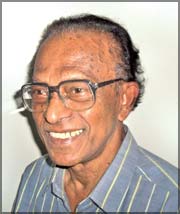Social work: A nourishing agent for rural development in Sri Lanka
Dr. Mathu H. Liyanage
Social services is the provision of services to meet the basic needs
of an individual such as food, clothing and shelter and other services
geared towards this end by providing material aid whereas social work
focuses on the strengths and weaknesses of an individual and provides
him/her support to sort them out in order to realize his/her potential
and become a self-reliant, self-confident and a productive person in the
community. It is really self-actualization - to turn potentiality to
actuality. The person becomes the best he/she can be.
|

Dr. Mathu H. Liyanage |
This mentality on the part of the successive governments in Sri Lanka
forced most of the officers professionally qualified in social work to
seek employment in other countries such as USA, UK and Australia. Those
who did not possess qualifications equivalent to a degree in social work
were unfortunately left out.
Even the Ceylon School of Social Work in the 1960s and 1970s produced
only diplomats with a 2-year diploma certificate. This fell far too
short as other countries insisted on a degree in social work or
equivalent qualifications. For instance, Australia insisted that the
qualifications should be approved by the Australian Association of
Social Workers to migrate to Australia.
It is laudable that the government of Sri Lanka established the
National Institute of Social Development (NISD) in 1992- the premier
institution of higher learning in social work education, training and
research. The University Grants Commission recognized it as a degree
awarding institution in Sri Lanka. The primary aim of NISD is to produce
professional social workers to service the social welfare system by
enhancing human resources for social development.
The Ceylon School of Social Work, which comes under the umbrella of
NISD, now conducts a 2-year Diploma program in social work, 4-year
Bachelor of Arts program in social work, and 2-year Master of Social
Work degree program.
Sri Lanka is predominantly an agricultural country with an
agriculture-based economy. About 80 per cent of the population lives in
rural areas. The incidence of poverty is high in the rural sector
compared with the urban and estate sectors.
Poverty in Sri Lanka is mainly a rural phenomenon, the rural sector
accounting for about four to fifths of aggregate poverty according to
the Department of Census and Statistics survey, 1990-91.
It is heartening to note that the World Bank’s Sri Lanka Director
Naoko Ishii, in a recent communiqu‚, commended the rural poverty
alleviation program ‘Gemi Diriya’ in empowering the poor and raising
incomes in some poorer provinces such as Uva, Southern and Sabaragamuwa.
It has financed 2,140 community infrastructure sub-projects, generated
about 18,500 jobs and provided livelihood activities to 140,000
households. It has also proved highly successful in transferring control
over decision-making and financial resources to rural communities.
Nevertheless, the incidence of poverty prevailing in rural areas
speaks loudly for the upliftment of agriculture and agrarian services.
President Mahinda Rajapaksa was quite right when he recently declared
that Sri Lanka should develop its agriculture-based economy in
preference to industrialization favoured by the Western countries. He
believes that, once the agriculture based economy is well-developed,
other industries and trades would follow on the heels of the improved
and sustainable agricultural economy.
To give effect to this far-sighted thinking, it is essential that
officers with social work qualifications should be involved in projects
at grass root levels. They are equipped to execute programs of
development than any other as they have learnt the theories and
techniques of working with individuals, groups and communities,
including leadership roles.
This might also enable them to realize their own potentials by
involving themselves in rural developmental projects. In the course of
their duties, they may well be in a position to suggest or recommend who
should really be able to maintain and sustain such projects without
allowing them to lapse into inaction or decay, as has been the case in
the past.
Needless to say that correct planning, organization and execution of
rural projects with socially-biased skilful workers at grass root levels
can make a tremendous contribution to realize the government mission to
make Sri Lanka a model country with an agriculture based economy to
surpass or be on a par with other countries that opt for
industrialization. |



